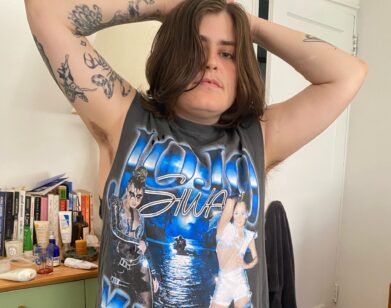Talk Hole: TikTok Suburbia, Swiss Heaven, and the Radical Sincerity of Goop

Talk Hole is the bi-weekly spoken column of New York’s alt-comedy darlings Eric Schwartau and Steven Phillips-Horst, offering their oracular powers of cultural analysis on all corners of the zeitgeist (high, low, top, bottom). Over big salads and several drinks at Honey’s, a meadery in Bushwick, Brooklyn, Schwartau and P-H (as Steven is lovingly referred) prove talk is chic and drop references to hot films, hotter temperatures, and scalding political debates. This time around, Talk Hole discusses the difference between sexy and horny, the aesthetic of TikTok suburbia, and why Gwyneth Paltrow is the most sincere celebrity selling charcoal sweaters today.
———
P-H: So, I have some topics. We were just talking about Kobe.
SCHWARTAU: I don’t think deaths are for takes necessarily. We’re culturally obsessed with the death take and that’s a problem.
P-H: It becomes the reaction to the death take, and then it becomes “who has the wrong death take, who has the right death take.” My friend sent me a take today that somehow connected to people who book problematic DJs.
SCHWARTAU: There’s always a way to talk about yourself.
P-H: And again, life is short.
SCHWARTAU: But sometimes it’s hard not to. We’re so in the trenches in our own lives. I sometimes feel like I’m blacking out every time I’m on Twitter.
P-H: I’ve integrated the insanity of the feed into my life, so I don’t really hang up my Kalashnikov, if you will. Or if you’re Mayor Pete [Buttigieg], your AR-33.
SCHWARTAU: Is that a … smaller weapon?
P-H: It’s a weapon for people who are 5’7. I did love that Mayor Pete said we love Kobe for what he did on and off the field.
SCHWARTAU: On and off the field. Gayest thing he’s ever said.
P-H: But if he’d said “on and off the court,” we would’ve been like, “Oh, good point.”
SCHWARTAU: On and off the lacrosse pitch. On and off the baseball diamond.
P-H: This isn’t South Africa. No one says lacrosse pitch.
SCHWARTAU: Squash ring.
P-H: Seven rings.
SCHWARTAU: Oh, right. The Grammys. Ariana [Grande] ran pop until Billie Eilish came around. I didn’t watch the Grammys. I watched the red carpet.
P-H: You literally identify as someone who didn’t watch the Grammys. Here’s the thing about Billie. I like her sexy music. For me, it’s perfect for putting in your fucking AirPods and stomping. She’s just whispering over a very minimal beat.
SCHWARTAU: I’m realizing that song “bad guy” makes more sense knowing that her brother wrote it. Because he’s a man.
P-H: That’s why the song is fun. If the song was called “bad girl,” it would be very cheesy and passé, but it’s bad guy. You’re like, whoa, she’s a girl.
SCHWARTAU: Right. And guys are allowed to be bad, more so than girls.
P-H: It’s like with the New York Times endorsing two women, they’re saying that we need society to be less toxically masculine even though Amy Klobuchar’s one thing is literally hurling objects at her staff.
P-H: Who hasn’t thrown a stapler? I mean, you’ve hurt me before, Eric.
SCHWARTAU: Name one hurt. Silence.
P-H: I just think that the Grammys, out of all the awards shows—the disconnect between the sort of authority they’re supposed to represent and how the actual music industry functions is, I think, the widest maybe.
SCHWARTAU: I’m just saying to me, music is a mood.
P-H: Yes. It’s dinner with friends. It’s lunch alone. It’s masturbating alone.
SCHWARTAU: Exactly. The trophy should be Best Music to Have Dinner Alone To.
P-H: I mean, that’s more like the MTV Video Music Awards.
SCHWARTAU: And it’s the ’90s again.
P-H: Okay, we both watched the Goop show.
SCHWARTAU: I loved it.
P-H: She is such a national treasure. A: It comes naturally to her. B: She doesn’t pretend to be this psychotic moralizing evangelist.
SCHWARTAU: That also is just how she brands her show. She’s like, “We’re just having experiences together.” That’s kind of what life is all about.
P-H: So many other people are essentially selling a lifestyle of pillows and just nice candles and pretending they’re Malala. Gwyneth is just like, “I’m selling throws. I’m selling charcoal sweaters and I realize that. I’m not trying to pretend that I’m not doing that.” And I love that she’s 50 percent bored the whole time.
Okay, can I say something else? I think Netflix is guilty of turning our world into this spiral of over-the-top dramatic earnestness where every cooking show is shot with 15 drone cameras and it’s a chef putting a piece of flan on a piece of smoked trout and saying, [British accent] “What he had done, no one had ever done before.” It’s this one random girl eating a taco and just being like, “I think that we’re actually bringing people together.” The Goop show, by contrast, is not presenting itself as being this path to moral absolution. It’s not “I’ll put you in a button-down and now you feel that inner confidence so you can get over the fact that your father beat your mother.” That was my Tan [France] impression.
SCHWARTAU: I feel like you’re critiquing all these shows, but I also think the algorithm is kind of reading you by feeding you all of these shows.
P-H: I’m not the only person who’s ever seen Queer Eye.
SCHWARTAU: You’re like, “I’m a rebel because when I watch the show, I don’t enjoy it.”
P-H: I feel like you’re being the Gwyneth right now and you’re not paying attention to me at all. This is the show. You look over at Gwyneth and she’s absolutely staring off into space.
SCHWARTAU: But she’s a rich-ass hoe. I’m just random.

P-H: The scene when the lesbian CFO turns to her and she’s like, “Yeah, people might look at you and they’re like, ‘She’s beautiful, she’s rich, she’s wealthy, she’s famous, she has everything,'” and then Gwyneth says, “Being the person that people perceive me to be is inherently traumatizing.”
SCHWARTAU: Everyone has the same feelings.
P-H: A friend of mine recently made this observation: “Everyone is in so much pain. Everyone walking around is in so much pain.”
SCHWARTAU: I just bought a book called All About Love by bell hooks, and that’s literally how it starts.
P-H: Okay, so my friend directly plagiarized bell hooks.
SCHWARTAU: When I bought this book at the bookstore on Flushing Ave—
P-H: “The Bookstore on Flushing Ave.” That sounds like a book. They made us read that in sixth grade.
SCHWARTAU: I went there with a friend—
P-H: I’d love to dig into what a friend means to you in a second.
SCHWARTAU: He was like, “I have All About Love. I’ll give it to you on PDF.”
P-H: That is the most queer thing to just be like, “I’ll send you the PDF.” Many years ago, I was gifted Bossypants, the Tina Fey audiobook, but it was in 72 different five-minute MP3s on iTunes. For years, I would just always be randomly listening to five-minute clips of Bossypants that started mid-sentence.
SCHWARTAU: Wow, we’ve come so far. Books are back.
P-H: Books are back!
SCHWARTAU: The bookseller who sold me the book said, “This is the classic break-up book.”
P-H: And you’re with this guy that you just fucked?
SCHWARTAU: No. I was with a friend, an actual friend. You can jerk off with someone and still be friends.
P-H: That’s true.
SCHWARTAU: I realized that you only feel love when you break up with someone, when it’s taken away from us.
P-H: That’s very Sam Hunt, famous philosopher and country star. “I’m Going to Make You Miss Me” is one of his Drake-y songs. It’s all about how “now that I’m gone, you’re going to realize how much you miss me.” It’s very self-aware and vulnerable for country.
SCHWARTAU: And yet, he’s probably everywhere she goes because she’s hearing his music everywhere. And reading this column.
P-H: His girlfriend left him because he cheated on her and then he wrote the song to get her back. He sings, “I’m sorry that you can’t go anymore to the place in Pelham,” and it’s like, you’re literally doxxing her in this song. Love is doxxing. Was that your claim?
SCHWARTAU: I don’t think that was my point…
P-H: There’s a Freudian or maybe Lacanian concept that the only desire is the desire of the other. I’m talking out my ass but to want someone is to want them wanting you. Have you seen The Dangerous Method?
SCHWARTAU: No.
P-H: It’s really good. It’s about Freud and Jung with Keira Knightley and Michael Fassbender. He plays Carl Jung and fucks Keira Knightley and it’s so hot you’re just like, “Oh my god.”
SCHWARTAU: And we haven’t seen her since.
P-H: Can Keira Knightley not be in a period piece challenge? She literally wishes to god it was 1880. You’re losing interest, but listen to me. What famous philosopher Keira Knightley says is that sexuality is actually about emptying out your consciousness for someone else.
SCHWARTAU: I think that’s just carnal desire.
P-H: I saw this trend of the New York Times finding out that things exist and there was this one article that was just like, “What’s with people saying ‘I want you to run me over’ or ‘Daddy, choke me’?” And it was the longest article that didn’t get the concept of just wanting to be subsumed by someone.
SCHWARTAU: Right. Does it go further than that though? What’s the next step?
P-H: After running me over? Back up and do it again.
We’re going to Mexico for an art fair which we think will be a really good opportunity for us to go back to Mexico. Mexico City, the locus of young queer freelancer energy right now.
SCHWARTAU: And it’s also everyone’s second choice.
P-H: It’s the Elizabeth Warren of cities?
SCHWARTAU: Yes, for practical reasons. If things don’t work out in Berlin or if you want to break up with your New York boyfriend but you’re too shy, you’re going to Mexico City.
P-H: I think that in 20 years, max 20 years, there will be no difference between any city. Every city’s becoming more Los Angeles. Anytime I go to Paris, for example, there’s more brunch places, there’s more bagel places, there’s more avocadorias. It’s just becoming more of this singular Airbnb aesthetic that you see everywhere.
P-H: Oh wait, can I ask you a question?
SCHWARTAU: Yeah.
P-H: A few days ago I passed through Herald Square on my way to this dog show at Hudson Yards. Herald Square basically could be Mall of America, right? If every city is going to look the same, is the future that kind of mall? Is it Edison-bulb-cum-Instagram-cappuccino aesthetic or is it a Macy’s-cum-Foot Locker?
SCHWARTAU: No, I think those things are going to separate even more. That reminds me of that movie Elysium where all the rich people just live in one city and all the poor people live in another.
P-H: No, they’re going to converge. Foot Locker is going to start doing bowls. There’s a Macy’s near my parents’ house in Boston. It’s kind of nice to be in a place where there’s 800 pairs of Calvin Klein underwear.
SCHWARTAU: Anytime I’m horny, I’m buying so much underwear.
P-H: I don’t feel sexy in a bodega or any New York store. The aisles are so narrow, so I don’t feel sexy.
SCHWARTAU: I did not say I feel sexy, I said I feel horny. Those are very different things.
P-H: I’m sorry—that was the sound of my brain exploding. Horny and sexy are two different things to you?
SCHWARTAU: Absolutely. Horny is the least sexy thing. You’re just laying in the dark jerking off for hours.
P-H: You’re speaking to your own experience.
SCHWARTAU: Sexy is looking at yourself in the mirror before going out and you’re taking a pic.
P-H: So one is being seen by others, and one is you do not want to be seen.
SCHWARTAU: Exactly. It’s so embarrassing to be horny. Horny is what you’re not supposed to show. Sexy is being suave and flirty. Sexy is a game.
P-H: I agree. I feel sexy when I am looking in the mirror—when I’m taking photos of myself in the mirror, when other people are taking photos of me and there’s a mirror in the room. But all those things come from a place of horniness. If sexuality is the now-debunked food pyramid, horniness is the carbs at the bottom, and sexiness is the fruits and vegetables.
SCHWARTAU: I agree, especially with the taking pictures element.
P-H: Because you are thirsty to be seen.
SCHWARTAU: You’re horny to be seen!
P-H: Sexy is how you mediate horny.
SCHWARTAU: Sexy is mainstream horny.
P-H: Yeah, sexy is managing horny for an audience.
P-H: The other topics on our list are horrifying. New York Times, Megxit, TikTok, Brad and Jen.
SCHWARTAU: I love that you have a little editorializing written there: “TikTok—is it ending?” TikTok isn’t ending.
P-H: I say that because I recently joined. I assume it’s the death knell for the app. Also Taylor Lorenz had that article recently that was like, “We’re all in our bathrooms on our phones,” and it’s kind of like all right, maybe phones in the bathrooms are kind of over if we’re now making the observation that we’re in our bathrooms.
SCHWARTAU: I thought that article was compelling.
P-H: If we’re at the point where the people over 30 are already now able to analyze this kind of media, then that media is losing its power to fuck shit up.
SCHWARTAU: What’s interesting about TikTok is the perfect confluence of the giant suburban house and the stage set for putting on huge video productions. Kids who live with their parents in big suburban homes use the app.
P-H: TikTok has been formed by the aesthetics of American capitalist suburbia. But now kids are moving to their own TikTok mansions. Seven kids move into a house and they’re consciously not furnishing them. And the videos are this kind of limp dancing and then it’s a lot of pointing to text.
SCHWARTAU: I love your analysis.
P-H: My very first video got taken down for violating community guidelines, and I don’t know what the guidelines that I’m violating are. [Pause.] You know, I helped work on an app that’s coming out soon.
SCHWARTAU: What app?
P-H: Geneva. It hasn’t launched yet. We came up with the name Geneva because it’s like a place of peace where people are civil to each other on an angry internet. Also the Swiss are rich.
SCHWARTAU: They just live in their little ivory tower, which is very attractive. Geneva’s not my favorite city in Switzerland, but I do love Switzerland.
P-H: That sentence—wow I am obsessed with it. Geneva is not my favorite city in Switzerland.
P-H: What’s your favorite city in Switzerland? Zurich?
SCHWARTAU: No, I just have this idea—okay. My dream …
P-H: Here we go.
SCHWARTAU: My dream is I’m walking down an empty European street and there are trees, and I’m just like looking up at the beautiful clean houses and it’s so silent. It’s just me, and I’m happy.
P-H: So what makes you happy is no people?
SCHWARTAU: Yeah.
P-H: That’s really telling. It’s funny how many times you are evoking these scenes of you alone.
SCHWARTAU: Well, to me those are the extremes. I love having people around. I crave community. Maybe that feeling of Zurich is like heaven. When I’m finally at peace is when I’m like—
P-H: Dead.
SCHWARTAU: So basically, I want to go to Switzerland when I’m dead.
P-H: Run me over in Zurich. And then back up and run me over again. Queue the New York Times article, “What’s with Millennials and Zurich?” I think we’re done talking.






